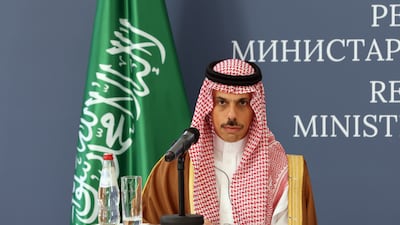Saudi Arabia's Minister of Foreign Affairs, Prince Faisal bin Farhan Al Saud, on Wednesday said Opec+ members acted "responsibly" in their decision to cut oil production by two million barrels per day.
The move provoked criticism from the White House, which said it would "review" its relationship with the kingdom.
When prices fell sharply, there were requests from the US administration and members of congress for the kingdom and Opec to support the stability of oil markets, Prince Faisal said.
"The Americans asked for our support when oil prices fell sharply," he told Al Arabiya, adding the Opec+ call was "purely economic, and it was taken unanimously by the member states" who took the "appropriate" decision.
Prince Faisal said Opec+ countries "seek to stabilise the market and achieve the interests of producers and consumers".
Last week, Opec+ announced it would slash its November output by two million barrels per day, its biggest production cut since the start of the pandemic in 2020, which led to a jump in oil prices.
'Total rejection' of criticism
On Thursday, the kingdom's Ministry of Foreign Affairs issued a statement rejecting criticism over the Opec+ decision.
White House National Security spokesman John Kirby said on Tuesday that President Joe Biden would review Washington's relationship with Saudi Arabia after the Opec+ decision.
The ministry's statement said the Saudi government "would first like to express its total rejection of these statements that are not based on facts, and which are based on portraying the Opec+ decision out of its purely economic context".
It said the decision was taken unanimously by all Opec+ member states "based purely on economic considerations". It also said any attempts to distort facts about the kingdom's position on the Ukraine crisis, including its vote to support UN resolutions, are "unfortunate".
The kingdom "stresses the importance of building on the solid pillars upon which the Saudi-US relationship has stood over the past eight decades". It said those pillars "include mutual respect" and "enhancing common interests".
Chairman of the Senate Foreign Relations Committee, Senator Bob Menendez, called for the US to "freeze all aspects” of Washington's co-operation with Saudi Arabia and threatened to block all future weapons sales.
Prince Faisal said Saudi Arabia's relationship with Washington is "strategic and supports the security and stability" of the region.
"Our relationship with the United States is institutional since the relationship between the two countries was established," he said.
He explained that because "there is no Opec-like administration for gas markets, prices have risen exponentially".
Solving global crises
Speaking of other issues facing the globe right now, the Saudi foreign minister said the war in Ukraine has significant economic consequences for the world and stressed the importance of bringing an end to the war. He said both countries should have a "dialogue to stop the conflict”.
He said efforts to extend the truce in Yemen still stand, Al Arabiya TV reported, after an initial UN-brokered pact between the Saudi-led coalition and the Houthi movement expired early this month.
The kingdom, the coalition and the Riyadh-backed Yemeni government are "keen on extending the truce," Prince Faisal said.
The United Nations is pressing for an extended and expanded truce that would build on the two-month one that expired on October 2 after being rolled over twice, and which has brought the longest stretch of relative calm in the seven-year conflict.

